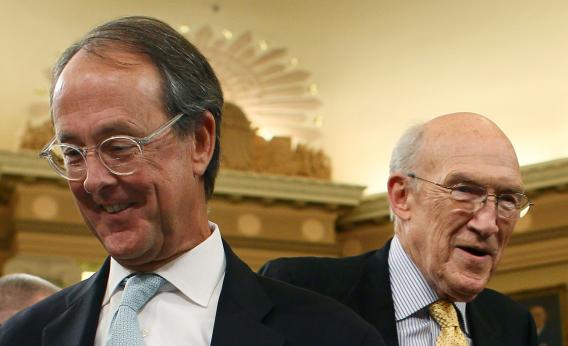The fiscal cliff is confusing, even to the Washington legislators arguing about it. On the one hand, the cliff consists of rapid deficit-reducing tax increases and spending cuts. On the other hand, the people most adamant about the need to avoid the cliff are calling for deficit reduction. I listened to No. 2 Senate Democrat Dick Durbin give a fiscal-cliff speech on Tuesday framed around the idea that “deficit reduction is a progressive cause.” The main anti-cliff group is even named Fix the Debt.
Congress has structured the rules so that only an agreement on long-term deficit reduction—a grand bargain—can prevent the growth-killing, short-term deficit reduction of the fiscal cliff. But that’s no coincidence. Proponents of the grand bargain to resolve long-term fiscal questions don’t favor a bargain because they want to avoid the fiscal cliff. They deliberately created the fiscal cliff in hopes that the emergency would set the stage for a grand bargain. It’s a strategy they hit upon only after their previous hope that the 2011 debt-ceiling crisis would force a bargain proved futile.
The problem is that the quest for the grand bargain is essentially a quest for the impossible. Whereas ginning up crises to force Congress to strike that impossible bargain is wreaking real tangible harm on the country. Whatever happens during the lame-duck session, the best thing for America would be for the great and the good in Washington and corporate America to drop their fixation with the grand bargain.
The grand bargain is impossible because it’s not possible for today’s Congress to bind the hands of future congresses. In 1997, for example, President Bill Clinton and House Republicans struck a grand compromise that reduced capital gains rates and expanded health care for children. By 2003, the budget framework of 1997 was completely obsolete, thanks to two rounds of Bush tax cuts and two new wars. The deal between Clinton and Newt Gingrich didn’t bind new leaders and didn’t foresee new circumstances. Nothing members of Congress agree to in 2012 or 2013 is going to change the fact that the 2019 budget deficit will be determined by the will of the politicians in office at that time and the situation they face.
And the current situation is that weak demand is giving us low and stable inflation plus low interest rates. This is not a problem that deficit reduction could solve. The sensible policy solution is to focus on the illness we have right now, and let decisions about long-term tax hikes and spending cuts be made later, when the patient is healthy.
When financial markets do eventually demand deficit reduction, they’ll want to see immediate tax hikes and spending rollbacks. That’s what happened repeatedly during the later Reagan years, in the big 1990 and 1993 budget deals, and in the eurozone periphery. It will be unpleasant when it happens, but it hasn’t happened yet, because the markets recognize that stabilizing the economy is more important. Simply promising that future congresses will do things differently impresses nobody. The various spending caps in the Simpson-Bowles plan no more prevent future spending than the 1997 budget deal prevented the Bush tax cuts, the post-9/11 hike in military spending, or the outlays associated with No Child Left Behind or the Medicare prescription drug benefit.
The only grand bargain that would work would be an abolition of democracy. How much the government should spend, and on what, and where the money should come from is the essence of politics. Corporate leaders’ hazy desire for long-term “certainty” is understandable to a point, but it’s completely impractical.
During the Bush years, the grand-bargain crowd was an amusing curiosity. But in the Obama years they’ve become actively dangerous. In part this is the result of Pete Peterson’s lavish funding of grand bargaineering crowding other, more solvable issues off the table. Even more insidious is the crisis-mongering. In the early days of the Obama administration, I heard some officials muse that sooner or later a bond market crisis would arise that would force Republicans to the table on taxes. More recently, I’ve heard of Wall Street types lamenting the absence of a bond-market crisis that would force Democrats to cut entitlements. This is the mentality that led the White House to initially welcome the 2011 debt-ceiling standoff as a useful trigger for a grand bargain. Instead, all it brought us is the fiscal cliff. The repeated crises are a dangerous game that discourages investment, thus leaving the country less prepared to meet the demands of an aging population. And all for an essentially worthless promise to reduce deficits in the future.
This cliff will probably be avoided, but whatever happens, it’s time to stop grand bargain fantasizing and start focusing on present-day problems.
